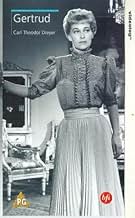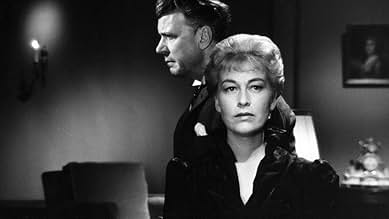Dans le monde élégant des artistes et musiciens, Gertrud quitte son mari Gustav et prend pour amant le compositeur Erland Jansson.Dans le monde élégant des artistes et musiciens, Gertrud quitte son mari Gustav et prend pour amant le compositeur Erland Jansson.Dans le monde élégant des artistes et musiciens, Gertrud quitte son mari Gustav et prend pour amant le compositeur Erland Jansson.
- Prix
- 3 victoires et 1 nomination au total
Edouard Mielche
- The Rector Magnificus
- (as Edouard Mielché)
Histoire
Le saviez-vous
- AnecdotesOne of Lars von Trier's favorite films.
- GaffesWhen Gertrud walks across the room in order to give Axel his letters back, the shadow from the camera and equipment can clearly be seen on the back wall.
- Citations
Gertrud Kanning: There's no happiness in love. Love is suffering. Love is unhappiness.
- ConnexionsEdited into Eventyret om dansk film 15: Fjernsyn og biografkrise - 1961-1965 (1996)
Commentaire en vedette
This is stunning work in my estimation but difficult. You will have to work and earn this movie for yourself, deserve it. Enter before you're ready and all you'll see is an empty room. Enter when you have come some way in your travels and you'll see there was not a single thing missing.
Modern and staid at the same time, Dreyer straddles both eras, someone who began in the silent era but paved the way for modernity. His Joan of Arc was a woman's passion rending the air around her, soul heaving from a body. Vampyr was dreamlike and floated. His next works quieted the passion, dimmed the seeing. Until we come to this, his very last one.
Even more deeply moored in characters, even more placid, even more renouncing of drama. If you simply try to see this as a drama (the way Wrath and Ordet can be seen), you may find the pace stolid, the same lugubrious articulation of feelings tiresome; you might note Gertrud's complete certainty in how she feels and being mildly tired to not find it as complacent.
But like Ordet is not a pastor's work, this is not merely a dramatist's, I don't think. It's true, his subjects give off a musty scent, are set in bygone days, but that's with the exception of this one, which is his most modern. So give it space, and it will begin to shine beyond simply these lives that we see.
Anchored in a woman and the men in her life as they come together for the occasion and part again, the occasion is that she decides to leave her husband for someone else, this is a prolonged contemplation of life gone. It's not just what these people explain about how they feel but these ruminations being deepened and sculpted in time, how they intersect; these translucent openings to rooms that I find myself in, the gentle dissonance between sense and discovery, the camera coming to and going again.
It's all that marvelous sense of inhabiting that room where feelings linger and take shape; for example the flashback to where she visits him in his house and he plays the piano, we don't seem him at first, only the room resplendent in radiant light as if her own soul lights it up and then fills it with song. Later, after she has lied about going to the opera and visits him again, the same room is now submerged in shadows, their hushed love affair far from the eyes of the world.
Two sides of Dreyer show through. Characters pouring out their inmosts gave rise to Bergman where it's the spoken word being sculpted; but even greater, the camera that waits and comes to, the way it stays time, shuffles and reveals, this is what Tarkovsky would extend in his own work. If the next step has been taken, and I think that's in a film with the magnitude of Zerkalo, the blueprint is here.
We glide through all of this stoically, as if it was always apparent that life wouldn't work out as dreamed so it's no real surprise. The husband frets and fights to keep her, later the poet ex-boyfriend pours his heart to her about the mistake of letting of her go; but the husband knows no words can change how someone feels, the other knows that her love grew to be a burden and he preferred his freedom. It's moot to fret now, those are words said to mark the occasion. The pianist turns out to be a boy, she accepts it.
It's all crystallized in the end, with her an old woman and being visited by the man she moved out to join in Paris. Maybe they would have liked to pursue what they didn't, maybe not. Nothing weighs between them. We have moved ahead as freely as we look back.
Everything here is a placeholder for life that you have gone through, maybe let slip through the fingers but neither glad nor saddened. It was what it was all about, life as a series of nights you shared, talks you had, visits to someone's room. Dreyer has prepared, purified, light that suffuses the memory, mends it back into body. The mind doesn't stray anymore, even as it does. It strays without losing its bearings, without giving into anxiety or despair. Dreyer's gaze is Gertrud's soul.
Modern and staid at the same time, Dreyer straddles both eras, someone who began in the silent era but paved the way for modernity. His Joan of Arc was a woman's passion rending the air around her, soul heaving from a body. Vampyr was dreamlike and floated. His next works quieted the passion, dimmed the seeing. Until we come to this, his very last one.
Even more deeply moored in characters, even more placid, even more renouncing of drama. If you simply try to see this as a drama (the way Wrath and Ordet can be seen), you may find the pace stolid, the same lugubrious articulation of feelings tiresome; you might note Gertrud's complete certainty in how she feels and being mildly tired to not find it as complacent.
But like Ordet is not a pastor's work, this is not merely a dramatist's, I don't think. It's true, his subjects give off a musty scent, are set in bygone days, but that's with the exception of this one, which is his most modern. So give it space, and it will begin to shine beyond simply these lives that we see.
Anchored in a woman and the men in her life as they come together for the occasion and part again, the occasion is that she decides to leave her husband for someone else, this is a prolonged contemplation of life gone. It's not just what these people explain about how they feel but these ruminations being deepened and sculpted in time, how they intersect; these translucent openings to rooms that I find myself in, the gentle dissonance between sense and discovery, the camera coming to and going again.
It's all that marvelous sense of inhabiting that room where feelings linger and take shape; for example the flashback to where she visits him in his house and he plays the piano, we don't seem him at first, only the room resplendent in radiant light as if her own soul lights it up and then fills it with song. Later, after she has lied about going to the opera and visits him again, the same room is now submerged in shadows, their hushed love affair far from the eyes of the world.
Two sides of Dreyer show through. Characters pouring out their inmosts gave rise to Bergman where it's the spoken word being sculpted; but even greater, the camera that waits and comes to, the way it stays time, shuffles and reveals, this is what Tarkovsky would extend in his own work. If the next step has been taken, and I think that's in a film with the magnitude of Zerkalo, the blueprint is here.
We glide through all of this stoically, as if it was always apparent that life wouldn't work out as dreamed so it's no real surprise. The husband frets and fights to keep her, later the poet ex-boyfriend pours his heart to her about the mistake of letting of her go; but the husband knows no words can change how someone feels, the other knows that her love grew to be a burden and he preferred his freedom. It's moot to fret now, those are words said to mark the occasion. The pianist turns out to be a boy, she accepts it.
It's all crystallized in the end, with her an old woman and being visited by the man she moved out to join in Paris. Maybe they would have liked to pursue what they didn't, maybe not. Nothing weighs between them. We have moved ahead as freely as we look back.
Everything here is a placeholder for life that you have gone through, maybe let slip through the fingers but neither glad nor saddened. It was what it was all about, life as a series of nights you shared, talks you had, visits to someone's room. Dreyer has prepared, purified, light that suffuses the memory, mends it back into body. The mind doesn't stray anymore, even as it does. It strays without losing its bearings, without giving into anxiety or despair. Dreyer's gaze is Gertrud's soul.
- chaos-rampant
- 26 févr. 2016
- Lien permanent
Meilleurs choix
Connectez-vous pour évaluer et surveiller les recommandations personnalisées
- How long is Gertrud?Propulsé par Alexa
Détails
- Durée1 heure 56 minutes
- Couleur
- Mixage
- Rapport de forme
- 1.66 : 1
Contribuer à cette page
Suggérer une modification ou ajouter du contenu manquant





















